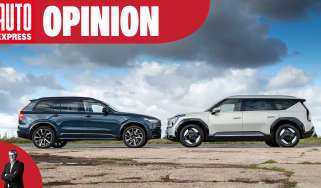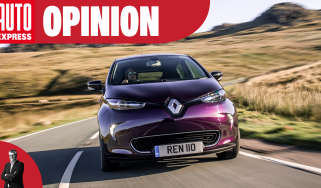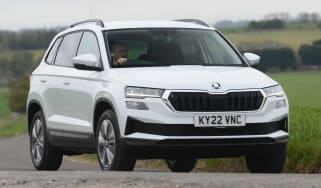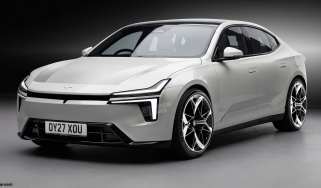Dear Donald Trump: this is why Europe won’t buy American cars
Editor-at-large Phil McNamara thinks Donald Trump has a few things to learn about the car market in the UK and Europe
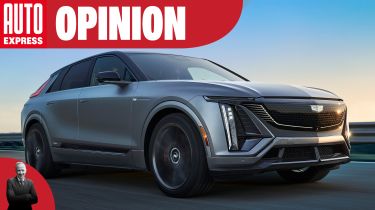
America and Britain are two nations divided by a common language, the saying goes. We say car, they say automobile and all that.
Nonetheless in 2024 a Ford topped the new-car sales charts in both the UK and the US. But not the same Ford: we flocked to the Puma, a tiddly crossover dwarfed by America’s top-selling F-150. The star spangled pick-up measures 1.1m longer – in its shortest form.
That’s one reason why President Donald Trump’s plaintive cry for Europeans to buy more American vehicles or face tariffs is hollow and self-serving. So many American vehicles don’t fit our tastes or use cases.
Imagine trying to cut through the narrow, bustling streets of Paris, France, in an F-150 or its big-selling fellow flat-beds, the Chevy Silverado or Dodge Ram? The French do use the term l’automobile, but the Dacia Sandero and Renault Clio small hatches were the continent’s top-sellers last year.
Americans are still partial to a big sedan too, with the US-built Toyota Camry the market’s top-selling four-door. Last year US Camry sales totalled 345,321, European sales 6,137. Toyota has periodically tried to sell the Camry in Britain, to brutal indifference. Even Japanese sales have stopped.
America’s great car makers have a chequered history in Europe. Despite the UK success of the Puma, Ford has shed more than 500,000 passenger car sales in Europe since 2018 by axing the Fiesta, Mondeo and its MPVs, while fumbling its SUV and electrification strategy.
General Motors lost around $20 billion (£16b) on Opel/Vauxhall from the millennium to 2017, when it cut and run by selling its European operations to Peugeot-Citroen.
That group subsequently became Stellantis after those European brands merged with Fiat-Chrysler. Independent companies import two of Stellantis’ American brands, Dodge and Chrysler. The Chrysler Pacifica is one of a dying breed of MPVs, Dodge makes hilariously fun muscle cars packing V6 or V8 engines; the punchiest seven-seat Durango SUV hoses out a huge 455g/km of CO2.
No wonder only 1,342 of these American cars arrived on mainland Europe; such profligate powertrains are completely out of step with tightening European CO2 standards.
And this is another huge trade barrier: Europe has the world’s tightest automotive regulation, America’s among the laxest. Former president Joe Biden’s pathway to improve US fuel efficiency standards is already under threat from the Trump administration, potentially making US imports even less suitable for Europe.
One fish out of water is the Tesla Cybertruck. Its sharp, stainless steel corners don’t meet European safety regulations and the pick-up weighs so much you need a truck licence to drive it.
The more compact Tesla Model 3 and Model Y are Europe’s top-selling electric cars (though that may change if Elon Musk’s recent behaviour has the impact some are expecting with European customers); the Y is assembled in Berlin. It’s the same for Jeep: to reduce lead times, shipping costs (and now potential tariffs), it manufactures cars in Italy, and offers the Puma-sized Avenger, which is too small for American tastes.
President Trump’s threats aren’t really about opening up the European market to more US imports, it’s a pre-emptive justification for imposing higher tariffs on German and Italian car exports to redress a trade imbalance. Currently America's tariff on European imports is 2.5 per cent (compared with 10 per cent for US imports to the EU) and EU car makers exported €56 billion (£45bn) of cars and parts to the States in 2023.
If President Trump hikes the EU car import tariff to 25 per cent, German and Italian automotive exports could fall by 7.1 and 6.6 per cent respectively, calculates a study by Oxford Economics. With 15 per cent of all European automotive output going to America, car makers will face a profitability hit, whether that’s from absorbing the extra import duties, suffering reduced demand or by trying to reconfigure their US factories to build more of the German premium cars most loved by American buyers.
Luxury car brands such as Lamborghini and Ferrari are best placed to weather the tariff storm: their wealthy customers should be able to absorb the extra cost and they don’t face much genuine competition from American rivals.
But it puts a question mark over Jaguar’s relaunch: the brand expects the USA to be its biggest market. And sales of Range Rovers and Porsche SUVs could decline if tariff-based cost hikes encourage price-sensitive US consumers to buy local instead.
Audi is the most exposed German brand, devoid of any US production unlike BMW and Mercedes. With Audi and Porsche SUVs sharing components, Volkswagen Group could be tempted to expand its production footprint Stateside. That would be very bad optics as VW seeks to reduce its excess European capacity – but a huge win for protectionism and Donald J Trump.
He doesn’t care whether we call them automobiles or cars, so long as they’re contributing more US import duties. And that exact reprisal just isn’t on the table for Europe – because we don’t buy American cars.
Would you buy an American car? Tell us your thoughts in the comments below...




